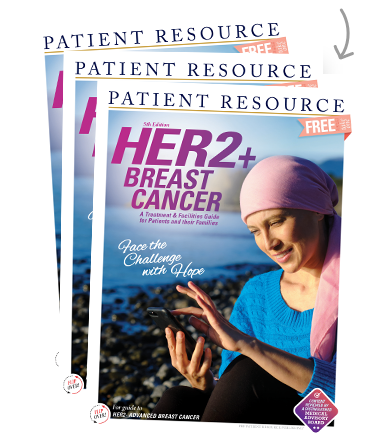HER2+ Breast Cancer
Healthy Lifestyle
Many parts of your diagnosis and treatment are out of your hands, and that’s not a good feeling. But there are parts of your life you can control, such as how you choose to care for yourself physically and emotionally. Having a well-balanced lifestyle may help you tolerate treatment better, lower the risk of a recurrence or the risk of other chronic diseases and help protect against secondary cancers. Following are suggestions for healthy ways to approach key elements of your everyday life.
Follow a nutritious diet and maintain a healthy weight.
It’s important to make smart eating choices before, during and after treatment. Guidelines for good nutrition include eating enough fruits, vegetables and high-quality protein, drinking plenty of fluids and limiting the amount of fat in your diet. Ask your doctor to recommend a registered dietician who can help you plan meals and make healthy food choices during treatment.
Your weight can fluctuate because of cancer treatment and its side effects. In some cases, it may be difficult to maintain your appetite, which may lead to weight loss. Fatigue and lack of exercise, combined with steroid treatment, may cause weight gain. Hormone therapy can increase your chance of gaining weight along with making it difficult to lose weight. Eating healthy foods, practicing portion control and increasing physical activity may help.
Get regular exercise.
Participating in physical activities can help you feel better overall. Although it may not seem to make sense, physical exercise is actually the best treatment for fatigue. Try to do some type of physical activity daily even if it is just walking for 10 minutes a day to start. Use sunscreen if your activities are outdoors.
Manage sleep problems.
You may have trouble sleeping. That’s common. One reason is that you may take frequent naps during the day, which then makes it difficult to sleep at night. You can still rest, but limit naps to 20 to 30 minutes each, and avoid napping in the late afternoon or early evening. Tell your nurse or nurse navigator about your sleep issues. Your doctor may recommend a sleep aid or change your medications if drug interactions or side effects are contributing to your sleep problems. Smell lavender, peppermint or both right before turning in as these scents help promote relaxation and sleep.
Talk to your children about cancer
Telling your kids you have cancer will be difficult, but you’re the expert on your children. You know better than anyone how they may react and how best to support them. The basic information they will likely need is the name of the cancer, the body part it affects, how it will be treated and how their lives will be affected. Use age-appropriate language. Younger children may only understand that you’re sick and need medicine to get better, whereas older children will likely want more information. At home, ask everyone to do their part to keep the household running, but remember that teens still need to be teens. Although they may be very capable of picking up more slack, they still need their Friday nights to hang out with their friends.
Maintain the household routine
Stick to the family schedule as much as possible. Kids – and adults – need to feel some sense of normalcy during a time of family stress. That means school activities, social events and family dinners must go on, if possible, regardless of cancer treatment.
Know your rights at work.
Working helps you feel normal, and maintaining normalcy is key right now. Discuss your need or desire to work with your treatment team so they can dovetail the treatment plan with your work schedule. For example, if side effects are predictably going to occur 24 hours after a treatment, get your treatment on a Friday afternoon so the side effects, if they were to occur, would happen on Saturday when you’re home and have family support. If you have chemotherapy on Wednesday, for example, and side effects happen every Thursday and Friday, you’d miss at least three days from work instead of one. Also, it’s smart to understand the protections afforded to you under the Americans with Disabilities Act (ADA) and the Family Medical Leave Act (FMLA). Applications for these programs must be filed through your company’s human resources (HR) department. Your HR team can explain any accommodations the company is able to make for you. This could be especially helpful if you need to take off for appointments or treatments or need extra time to rest after treatments.
Understand your insurance benefits.
If you have health insurance, carefully review your policy so you know the rules and procedures to follow and what is covered. If you have cancer but don’t have health insurance, an independent insurance broker may be able to find insurance for you, or you may qualify for assistance from your state’s Medicaid program if your income is low and you meet certain other criteria. Apply even if you’re not sure you meet the criteria. A Medicaid caseworker will evaluate your situation and decide whether you qualify. Financial assistance organizations may also be able to help with your bills.
Reduce costs with patient assistance programs.
Your health care team understands that treatment is expensive. Ask your nurse navigator about patient assistance programs available to help offset the cost of your medications or copays. Your doctor may be able to prescribe alternative treatment options that are less expensive but just as effective. Ask about the availability of generic drugs, which would have the same effect. Try to get a drug that is on your insurer’s preferred drug list because reimbursement may be higher.



